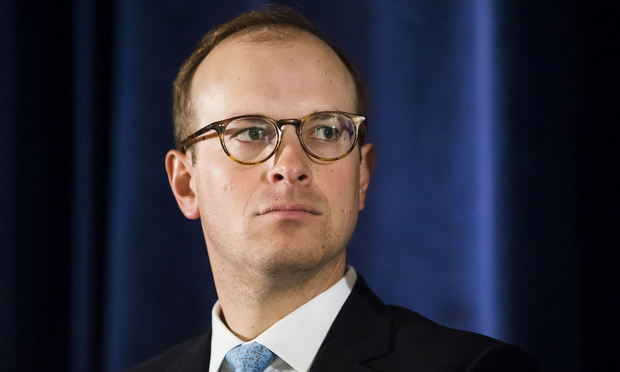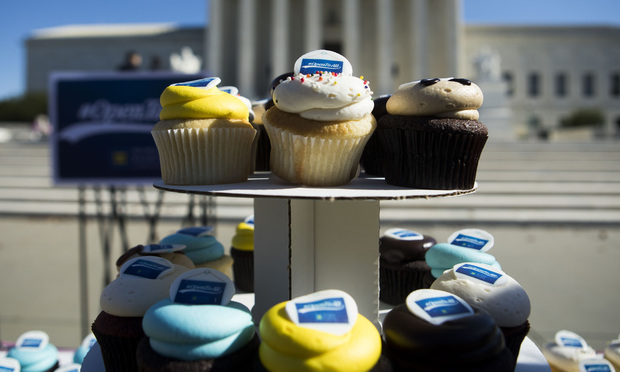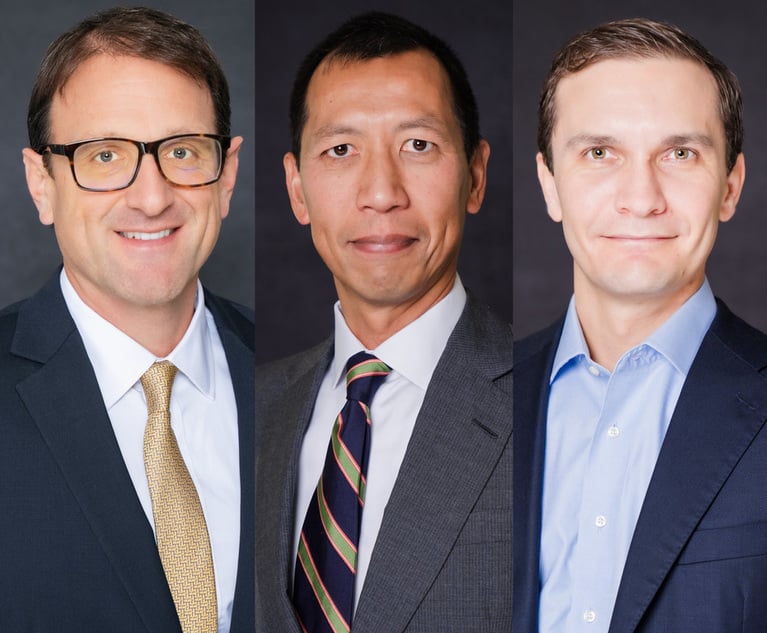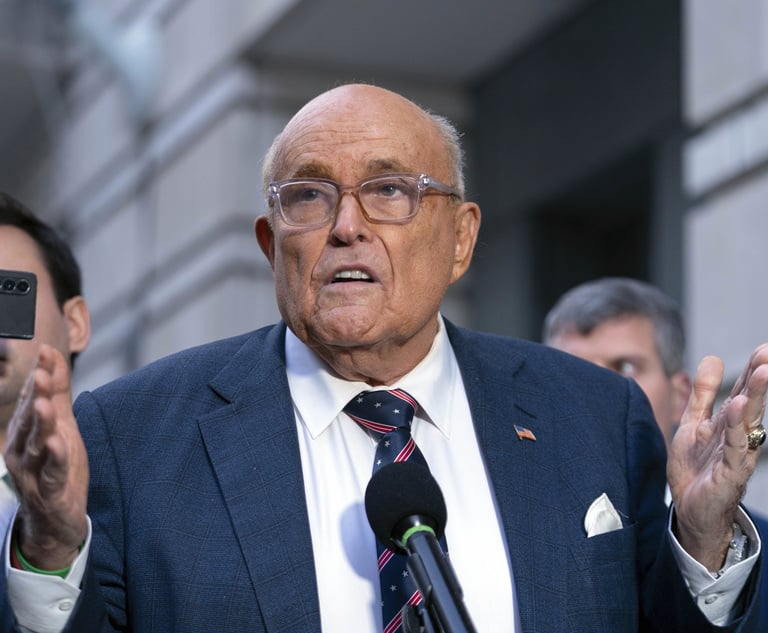Unresolved Questions Await Supreme Court After Landmark LGBT Rights Ruling
The pending cases raise questions involving the intersection of religion and anti-discrimination laws, an issue left unresolved by the justices' landmark decision extending workplace anti-bias protections to gay, lesbian and transgender employees.
June 17, 2020 at 05:35 PM
8 minute read
The original version of this story was published on National Law Journal
 U.S. Supreme Court. Credit: Mike Scarcella / NLJ
U.S. Supreme Court. Credit: Mike Scarcella / NLJ
After the U.S. Supreme Court's historic decision barring employers from firing workers based on their sexual orientation or gender identity, a series of cases pending before the justices asks them again to confront discrimination against LGBT individuals.
On Monday, the justices formally requested the views of the U.S. solicitor general in a case brought by Texas against what it calls California's "blacklisting" of states with certain laws allowing discrimination against LGBT persons. The court also has set oral arguments for next term in the case Fulton v. City of Philadelphia. That dispute centers on the city's anti-discrimination rules regarding foster care services.
The two disputes, and others, including one where a court clerk refused to grant a marriage certificate for a same-sex couple, raise questions involving the intersection of religion and anti-discrimination laws, an issue left unresolved by the justices' decision in Bostock v. Clayton County, Georgia, and their application of Title VII's anti-discrimination bar to protect gay, lesbian and transsexual workers.
"If the question in the workplace discrimination cases brought by Aimee Stephens, Donald Zarda, and Gerald Bostock was what the law means, the question in these next cases is when and whether the law matters," Rose Saxe, deputy director of the ACLU's LGBT & HIV Project, said in a blog post Wednesday. The win for LGBT rights in the workplace, Saxe continued, "is fragile and will be eroded if the court furthers the agenda of the Trump administration by giving anyone who objects on religious grounds a free pass to violate the law."
In the Texas case, the state challenges a California law that prohibits California agencies from approving state-funded or state-sponsored travel to a state that, after June 26, 2015—when the U.S. Supreme Court ruled in support of gay marriage—enacted a law that authorizes or requires discrimination on the basis of sexual orientation, gender identify or gender expression.
The California attorney general is required to keep a list of states whose actions trigger the restriction on state-funded travel. Eleven states are on the California list, according to briefs filed in the case. Texas was included because of a state law that protects foster-care or adoption agencies that discriminate—for religious reasons—on the basis of sexual orientation or gender identity.
Texas, represented by state solicitor general Kyle Hawkins, has argued the California law was born of religious animus and violates the privileges and immunities, interstate commerce and equal protection clauses. California deputy solicitor general Samuel Harbourt countered that the law does not bar any commerce or prohibit any travel into or out of California; it instead limits what out-of-state travel California will pay for. "A state's control over its own public fisc is a core aspect of state sovereignty," Harbourt wrote in urging the justices to reject original jurisdiction over the dispute.
In the Philadelphia case, Catholic Social Services and several foster parents challenge the city's policy of barring referrals of foster children to that agency because it refuses, for religious reasons, to license same-sex couples as foster parents. They argue the city's policy violates their First Amendment free exercise and free speech rights.
The petition also urges the justices to revisit their 1990 ruling in Employment Division v. Smith. In that ruling, Justice Antonin Scalia, writing for the majority, said the free exercise right does not relieve an individual of the obligation to comply with a valid and neutral law of general applicability.
Mark Rienzi of The Becket Fund for Religious Liberty is representing the challengers to the city's policy. Gupta Wessler partner Deepak Gupta is counsel to the city. The ACLU's Leslie Cooper represents intervenor-respondents Support Center for Child Advocates and Philadelphia Family Pride.
More than 30 amicus briefs supporting the challengers have been filed by the Trump administration, religious and conservative organizations as well as a number of states. Amicus briefs supporting the city are not yet due. No date has been announced yet for the arguments.
 Jeffrey Harris, a Consovoy McCarthy partner. Credit: Diego M. Radzinschi/ ALM
Jeffrey Harris, a Consovoy McCarthy partner. Credit: Diego M. Radzinschi/ ALMIn March, Dignity Health, a Catholic hospital represented by Consovoy McCarthy partner Jeffrey Harris, filed a petition asking the justices to review a California Court of Appeal decision that rejected its First Amendment defenses to a lawsuit brought under the California Unruh Civil Rights Act. Evan Minton sued the hospital because it refused to perform an elective sterilization procedure.
In the petition, Harris argues that performing the procedure was prohibited by ethical and religious directives that govern Catholic health care institutions. The state court, he wrote in the petition, relied on the U.S. Supreme Court's decision in Employment Division v. Smith. If the justices do not grant review outright, Harris added, they should hold the petition pending their decision in the Fulton case.
A response to the hospital petition is not due until July 15. Minton is represented by the ACLU's Amanda Goad.
The court also has a petition that mixes religious beliefs, same-sex marriage and qualified immunity. In that case, Kim Davis, a Kentucky county clerk, refused to issue marriage licenses to same-sex couples after the Supreme Court's landmark same-sex marriage ruling in 2015, Obergefell v. Hodges.
Two same-sex couples sued for damages against Davis, former clerk of Rowan County, Kentucky, when she refused, for religious reasons, to issue any marriage licenses under her name and authority following the justices' 2015 decision. The U.S. Court of Appeals for the Sixth Circuit rejected her arguments that she was entitled to qualified immunity.
"This case has always been about whether the law forces an 'all or nothing' choice between same-sex marriage on the one hand, and religious liberty on the other, with no regard whatsoever for any reasonable accommodation," Davis' lawyer, Mathew Staver of Liberty Counsel, wrote in the case Davis v. Ermold.
But the case does not involve whether people of good conscience may disagree with the justices' same-sex marriage decision or whether private businesses can refuse to provide goods or services in connection with same-sex marriages, Adam Pulver of Public Citizen Litigation Group countered.
"The straightforward issue in this case is whether, after Obergefell, it was clearly established that a state official cannot deprive citizens of their right to marry based solely on personal disapproval of same-sex marriage," Pulver told the justices. "Thus, the allegations that Petitioner Kim Davis denied respondents marriage licenses solely because of her personal opposition to same-sex marriage—even after a district court and the Sixth Circuit told her she could not do so—support a denial of qualified immunity."
 Human Rights Campaign delivered an amicus brief in support of equality and gay couples in the case "Masterpiece Cakeshop v. Colorado Civil Rights Commission," on Oct. 30, 2017. Credit: Diego M. Radzinschi / ALM
Human Rights Campaign delivered an amicus brief in support of equality and gay couples in the case "Masterpiece Cakeshop v. Colorado Civil Rights Commission," on Oct. 30, 2017. Credit: Diego M. Radzinschi / ALMAnd lingering on the court's docket for nearly a year is the return of Arlene's Flowers v. Washington in which a floral designer, citing her religious beliefs, refused to create a floral arrangement for a same-sex wedding.
In June 2018, the justices granted Arlene's Flowers first petition, vacated the judgment of the Washington Supreme Court and remanded the case for further consideration in light of the justices's ruling in Masterpiece Cakeshop v. Colorado Civil Rights Commission. The latter case involved a baker who refused on religious grounds to make a wedding cake for a same-sex couple. Both cases involved state anti-discrimination laws.
In June 2019, the Washington Supreme Court again rejected free speech and free exercise arguments by Arlene's Flowers.
Governments "across the country have continued to slur, shun, punish, and threaten to imprison those whose faith compels them to honor their religious beliefs about marriage," wrote Arlene's Flowers counsel Kristen Waggoner of Alliance Defending Freedom in the latest petition.
The state supreme court "fully embraced" the Masterpiece Cakeshop ruling and call for respect for sincere religious beliefs and for gay persons seeking goods and services in an open market, countered state solicitor general Noah Purcell. "The court carefully reviewed and reconsidered its prior decision in light of this principle, ultimately reaffirming the trial court in a unanimous decision," he wrote in urging the justices to deny review.
The ACLU's Ria Tabacco Mar represents the gay couple in the case is also opposing review.
This content has been archived. It is available through our partners, LexisNexis® and Bloomberg Law.
To view this content, please continue to their sites.
Not a Lexis Subscriber?
Subscribe Now
Not a Bloomberg Law Subscriber?
Subscribe Now
NOT FOR REPRINT
© 2025 ALM Global, LLC, All Rights Reserved. Request academic re-use from www.copyright.com. All other uses, submit a request to [email protected]. For more information visit Asset & Logo Licensing.
You Might Like
View All
Litigators of the Week: A $630M Antitrust Settlement for Automotive Software Vendors—$140M More Than Alleged Overcharges

A Second Straight Year of Increased Securities Filings—With Perhaps More on the Horizon
Trending Stories
- 1Uber Files RICO Suit Against Plaintiff-Side Firms Alleging Fraudulent Injury Claims
- 2The Law Firm Disrupted: Scrutinizing the Elephant More Than the Mouse
- 3Inherent Diminished Value Damages Unavailable to 3rd-Party Claimants, Court Says
- 4Pa. Defense Firm Sued by Client Over Ex-Eagles Player's $43.5M Med Mal Win
- 5Losses Mount at Morris Manning, but Departing Ex-Chair Stays Bullish About His Old Firm's Future
Who Got The Work
J. Brugh Lower of Gibbons has entered an appearance for industrial equipment supplier Devco Corporation in a pending trademark infringement lawsuit. The suit, accusing the defendant of selling knock-off Graco products, was filed Dec. 18 in New Jersey District Court by Rivkin Radler on behalf of Graco Inc. and Graco Minnesota. The case, assigned to U.S. District Judge Zahid N. Quraishi, is 3:24-cv-11294, Graco Inc. et al v. Devco Corporation.
Who Got The Work
Rebecca Maller-Stein and Kent A. Yalowitz of Arnold & Porter Kaye Scholer have entered their appearances for Hanaco Venture Capital and its executives, Lior Prosor and David Frankel, in a pending securities lawsuit. The action, filed on Dec. 24 in New York Southern District Court by Zell, Aron & Co. on behalf of Goldeneye Advisors, accuses the defendants of negligently and fraudulently managing the plaintiff's $1 million investment. The case, assigned to U.S. District Judge Vernon S. Broderick, is 1:24-cv-09918, Goldeneye Advisors, LLC v. Hanaco Venture Capital, Ltd. et al.
Who Got The Work
Attorneys from A&O Shearman has stepped in as defense counsel for Toronto-Dominion Bank and other defendants in a pending securities class action. The suit, filed Dec. 11 in New York Southern District Court by Bleichmar Fonti & Auld, accuses the defendants of concealing the bank's 'pervasive' deficiencies in regards to its compliance with the Bank Secrecy Act and the quality of its anti-money laundering controls. The case, assigned to U.S. District Judge Arun Subramanian, is 1:24-cv-09445, Gonzalez v. The Toronto-Dominion Bank et al.
Who Got The Work
Crown Castle International, a Pennsylvania company providing shared communications infrastructure, has turned to Luke D. Wolf of Gordon Rees Scully Mansukhani to fend off a pending breach-of-contract lawsuit. The court action, filed Nov. 25 in Michigan Eastern District Court by Hooper Hathaway PC on behalf of The Town Residences LLC, accuses Crown Castle of failing to transfer approximately $30,000 in utility payments from T-Mobile in breach of a roof-top lease and assignment agreement. The case, assigned to U.S. District Judge Susan K. Declercq, is 2:24-cv-13131, The Town Residences LLC v. T-Mobile US, Inc. et al.
Who Got The Work
Wilfred P. Coronato and Daniel M. Schwartz of McCarter & English have stepped in as defense counsel to Electrolux Home Products Inc. in a pending product liability lawsuit. The court action, filed Nov. 26 in New York Eastern District Court by Poulos Lopiccolo PC and Nagel Rice LLP on behalf of David Stern, alleges that the defendant's refrigerators’ drawers and shelving repeatedly break and fall apart within months after purchase. The case, assigned to U.S. District Judge Joan M. Azrack, is 2:24-cv-08204, Stern v. Electrolux Home Products, Inc.
Featured Firms
Law Offices of Gary Martin Hays & Associates, P.C.
(470) 294-1674
Law Offices of Mark E. Salomone
(857) 444-6468
Smith & Hassler
(713) 739-1250








